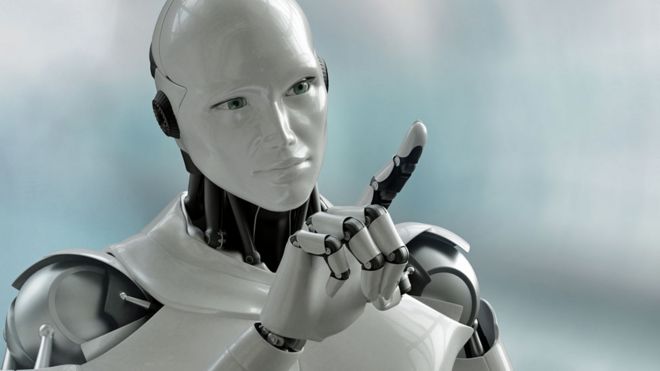Could robots be marking your homework?
Source: Sean Coughlan
 What do you call a sick bird? An illegal.
What do you call a sick bird? An illegal.
OK, it's not exactly hilarious.
But it's not a joke from a five-year-old with a Christmas cracker.
This is computer-generated wordplay and an example of how the boundaries of artificial intelligence are shifting.
If a computer can crack jokes, what other human activities could they start to replicate? What jobs could it take?
Artificial intelligence has become an increasingly big issue for education - not least because many tech companies and publishers are circling around the huge commercial opportunities.
But could students really get their answers from a robot rather than a teacher?
Dr Tarek Besold, speaking at the annual OEB educational technology conference in Berlin, said a joke-writing computer showed how robots could be creative as well as carrying out repetitive, factory-floor tasks.
And he highlighted experiments already taking place in using artificial intelligence in teaching.
Digital teacher
This summer, Georgia Tech, a university in Atlanta in the US, deployed a teaching assistant called Jill Watson for one of its postgraduate courses.
Except that Jill Watson was really a robot, who helped students and answered their questions in an online forum, without revealing her cyber-identity.
More stories from the BBC's Global education series looking at education from an international perspective, and how to get in touch.
You can join the debate at the BBC's Family & Education News Facebook page.
The only thing that students noticed was that Jill Watson answered questions and provided feedback much more quickly than other teaching assistants.
Dr Besold, from Bremen University, said such robotic teachers were becoming increasingly sophisticated and had advantages over human teachers.
They were always ready to respond, they were never bored, tired or distracted.
But such clever computers could also be stupid.
While they could be trained to operate for a particular task or set of questions, they couldn't easily adapt that knowledge to a different setting.
For example, Dr Besold said a human who was good at chess would be likely to be able to play draughts; while a chess computer would struggle, unless it had been specifically programmed.
There are also more subtle questions about online help from a robot. Would you feel the same about positive feedback if it came from a machine rather than a person?
What about the pastoral side of teaching? Could a robot offer empathy as well as factual insights?
And academic instruction is often not about "right" or "wrong" answers, but teaching how to think and investigate.
Destroying jobs
Donald Clark, a professor at Derby University and an education technology entrepreneur, said it was a mistake for anyone to think that education would be exempt from the impact of automation.
"Are we really saying that accountants, lawyers and managers can all be replaced by artificial intelligence - but not teachers?" he told the OEB conference.
Image copyright Patrick Meinhold
Image caption Nell Watson questioned whether a robot could appreciate a creative student's answers
He argued that artificial intelligence would change office jobs and professions in the way that automation had already transformed production lines.
"Artificial intelligence will destroy jobs - so why not use it for a social good such as learning?" he asked.
The acceleration of big data and more powerful computer systems meant that more and more sophisticated tasks could be automated, said Prof Clark.
It is already ebbing around the edges of education.
Online tutors
The name of Georgia Tech's robot teacher - Jill Watson - is a reference to the underlying Watson computer system, developed by IBM to answer questions in ordinary language.
The Watson system is also being used in an experimental project from Pearson, the global education company.
Pearson is testing a digital education project that combines an interactive textbook, online course and automated tutor.
A student follows lessons on the computer screen, with a Watson-powered robot helper integrated into the system - asking questions about each topic, offering prompts and giving assistance.
It's like typing messages back and forth - but the person replying is a computer.
This project is still in the laboratory phase, but there are plans to begin rolling it out more widely next summer, with Pearson and IBM having signed a partnership.
It's not going to replace a conventional teacher, but it's an indication of how online courses and revision tutorials could develop, with testing and feedback all wrapped up together.
But there are sceptics who see this as another wave of technology over-promising.
"We've been here before - with radio, television, computers, the internet," said Stavros Yiannouka, chief executive of the Wise project, run by the Qatar Foundation.
"Technology in itself doesn't revolutionise anything," he said. Change in education is driven by public policy decisions, he said, not computer software.
There are also questions about whether automation will create a social divide - with stripped down, low cost, semi-automated courses, for those who cannot afford a traditional taught course.
Entrepreneur Nell Watson told the OEB conference that despite describing herself as a "happy clappy evangelist" for artificial intelligence, the role of teacher would not be replicated by a robot.
Cultivating the whole person and helping them to "blossom" was not something that was going to be achieved by an algorithm, she said.
And she doubted whether a computer could appreciate the work of an innovative student who thought outside the conventional questions and answers.
But automation is advancing.
The Bank of England's governor, Mark Carney, said this month that 15 million jobs in the UK could be automated, including middle-class professions.
Changes in technology would "mercilessly" destroy jobs, he said.
So could it be "Goodbye Mr Chips" and "Hello Mr Silicon Chips"?
| }
|